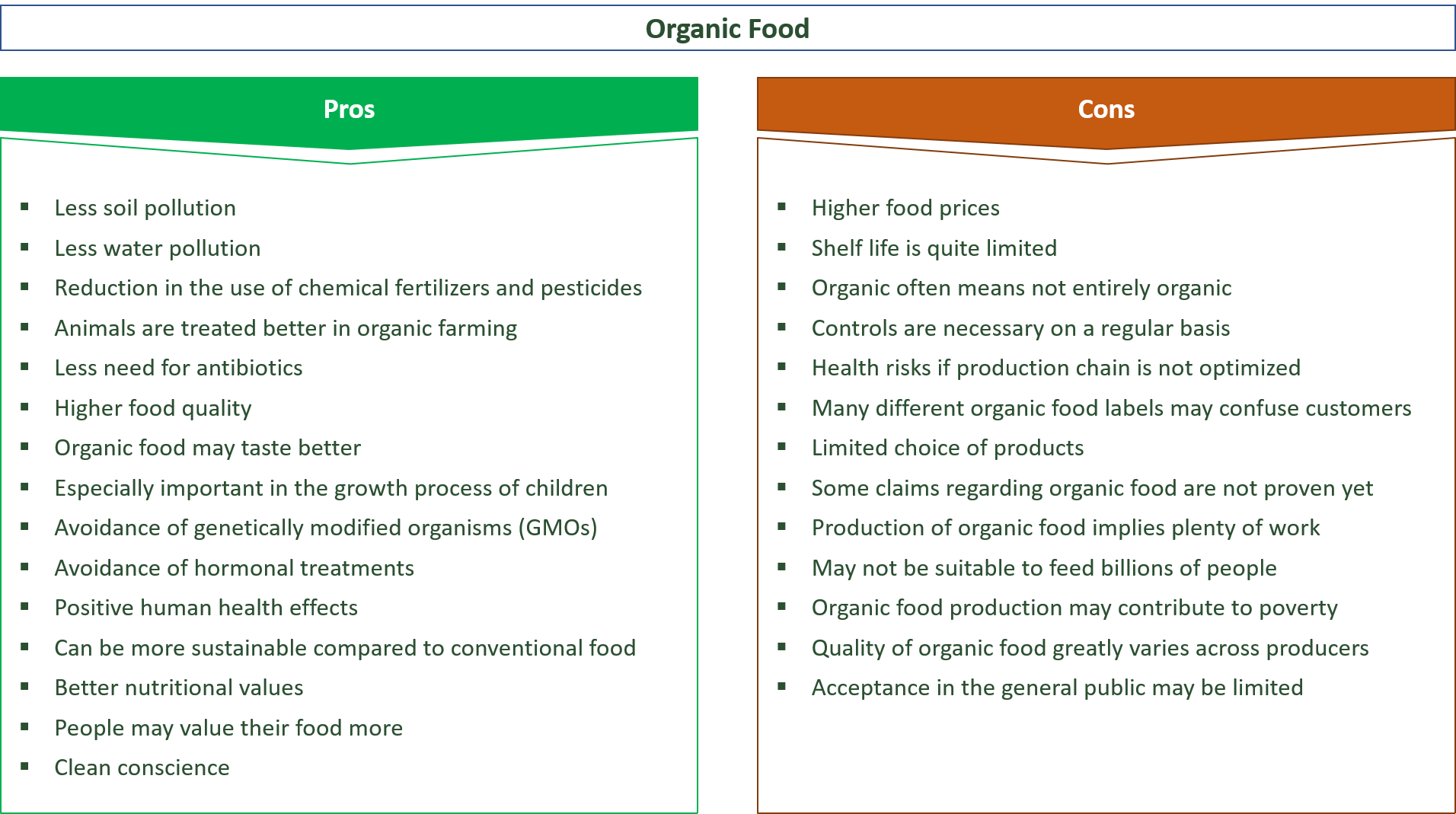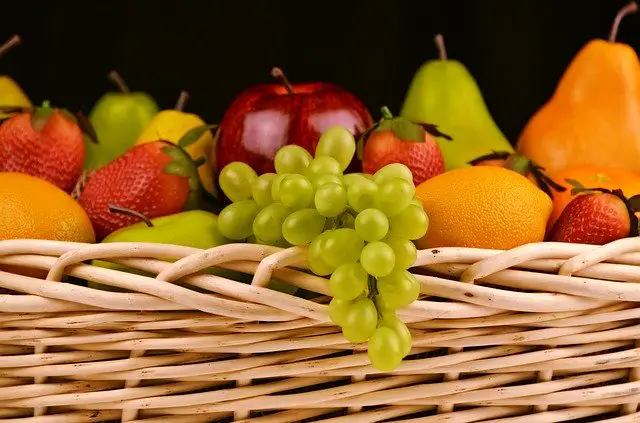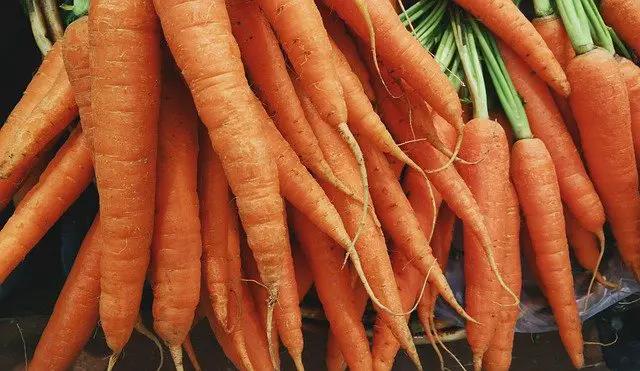” When I tour, I stuff fridges full of organic food and stick to that.”
Avril Lavigne, Musician
Advantages & Disadvantages of Organic Food

Organic food is food that comes from farms that follow the rules and regulations related to organic farming.
Organic food products have become increasingly popular over the past years since people become more aware of what they are eating.
Moreover, many people do not want to buy meat from factory farming anymore since they learned how poorly animals are treated in the processes related to it.
However, apart from the many advantages organic food has to offer, there are also some issues related to it.
In this article, the pros and cons of organic food are examined.
Audio Lesson
Contents
Advantages of Organic Food
- Less soil pollution
- Less water pollution
- Reduction in the use of chemical fertilizers and pesticides
- Animals are treated better in organic farming
- Less need for antibiotics
- Higher food quality
- Organic food may taste better
- Especially important in the growth process of children
- Avoidance of genetically modified organisms (GMOs)
- Avoidance of hormonal treatments
- Positive human health effects
- Can be more sustainable compared to conventional food
- Better nutritional values
- People may value their food more
- Clean conscience
Less soil pollution
One important advantage of organic products is that they imply less soil pollution in the production process.
Our soil is massively polluted on a daily basis from conventional agricultural processes since in those processes, large amounts of harmful substances that promote plant growth are used and the soil will eventually degrade over time.
This may even lead to a state where the soil will no longer be suitable for farming at all, which may imply a loss of food production capacities and may therefore also increase global hunger.
Thus, by using organic products rather than conventional ones, you can mitigate the soil pollution process to a certain extent since the level of soil pollution will often be much lower in those organic farming practices.
Less water pollution
Soil pollution related to conventional farming practices also implies serious water pollution.
A big fraction of the substances that are contained in the soil will be eventually washed through the soil into the groundwater.
Thus, depending on how eco-unfriendly conventional agricultural processes had been in the past, chances are that large amounts of harmful chemicals will end up in our groundwater sooner or later.
Since water will become a quite scarce resource in the future due to global warming, especially in the Southern hemisphere of our planet, the preservation of our groundwater is quite important and organic farming can make an important contribution towards the right direction.
Reduction in the use of chemical fertilizers and pesticides
Another upside of organic food is that for the production of this kind of food, fewer chemical pesticides and fertilizers have to be used.
However, contrary to popular beliefs, organic farming does not completely refrain from the use of those substances since yields would be too low to sustain those businesses in the long run.
Thus, even though chemical substances are not completely abandoned in the production process of organic food, the total amount of those substances can still be significantly reduced.
Animals are treated better in organic farming
Another major benefit of organic meat is that animals are treated much better on average compared to animals that are raised through factory farming practices.
In factory farming, animals only have quite limited space and are often barely able to move at all.
There are several other factors that make the living conditions of animals that are raised in factory farms quite bad.
In order to significantly improve those conditions, you should buy organic meat instead since animals who have grown up in organic meat farming will have much more space to move and a much better overall life compared to animals from conventional farming practices.
Less need for antibiotics
The production of organic food, especially the production of organic meat, also does not require high levels of antibiotics use.
While in factory farming, large numbers of animals are raised on a quite limited space, large amounts of antibiotics have to be used in order to keep all those animals healthy and to avoid the spread of diseases.
However, in organic meat production, the use of antibiotics is quite restricted and therefore, there is far less need and use of antibiotics for organic meat production.
Since an excessive use of antibiotics can also lead to antibiotic resistance for humans, it is crucial that we reduce the amount of antibiotics whenever we can.
Higher food quality
Organic products tend to be of much better quality compared to products that are produced in a conventional manner.
For instance, since animals that are raised in an organic manner live longer and will have more space to move, they are able to build up more muscle mass.
In turn, the meat will be of better quality compared to meat that is produced through factory farming and contains more water.
Organic food may taste better
Even though this has not been proven yet in official studies, many people claim that organic food also tastes better.
This feeling may not solely due to the product itself, but also since people believe that organic food tastes better and from this belief, a kind of placebo effect may develop.
Therefore, although it is questionable whether organic food really tastes better compared to conventional food or not, organic food will for sure not taste worse and it is therefore worth giving it a try for sure.
Especially important in the growth process of children
Many studies have shown that high-quality food is crucial for children in order to grow up in a healthy manner.
Thus, organic food may be quite beneficial for your children since their body and their brain can develop in an optimal manner.
Moreover, protecting your children from the antibiotics and other harmful substances that are contained in conventional products may also be a good idea since it is still not quite clear how the consumption of those products will affect our body in the long run.
Avoidance of genetically modified organisms (GMOs)
Organic food production companies also avoid the use of genetically modified organisms.
In the food world, this means that the food is produced without using genetically modified plants.
Many scientists claim that we should stop manipulating the DNA of plants since the long-term consequences of playing god are still unclear and humanity will suffer from serious problems sooner or later due to that.
Thus, by buying organic foods, you can support companies that refrain from genetic modifications of plants in the production process.
Avoidance of hormonal treatments
In mainstream agriculture, animals also get hormonal treatments from time to time in order to grow faster and to gain more weight so that animals can be processed into meat as soon as possible.
However, those hormonal treatments may not be healthy for us humans and may also lead to unpleasant long-term effects.
Thus, in order to protect yourself from those hormones, you might want to rely on organic products instead.
Positive human health effects
Since organic foods are produced with less chemical fertilizers and pesticides, they are less contaminated with harmful substances and therefore often much better for our health.
Moreover, since fewer antibiotics are used, also the risk of becoming antibiotic-resistant is much lower if you rely on organic food instead of conventional food.
Thus, in case of a serious disease, you might be suitable for antibiotic treatment while a person who developed an antibiotic resistance due to conventional food consumption might not be suitable for this kind of treatment and may even die from the disease since doctors may not be able to treat this person properly if antibiotics no longer work for him.
Thus, organic food should also be clearly preferred from an overall health perspective.
Can be more sustainable compared to conventional food
Since conventional farming often uses plenty of chemical fertilizers and pesticides, it may sooner or later pollute the soil too much and the soil may become unsuitable for farming purposes in the long run.
Thus, organic food can be considered to be more sustainable since the level of soil pollution will be much lower and the soil will be able to recover and may be suitable for organic farming for many decades or even centuries.
Better nutritional values
Some studies have also shown better nutritional values of organic products on average.
Although the quality of organic products greatly varies across producers, more healthy vitamins and minerals will be contained in organic food products compared to conventional products most of the time.
This may further give you the opportunity to improve your overall health level.
People may value their food more
Since organic food is more expensive on average, people may also value their food much more if they have to spend more money on it.
People may also become more aware of their diet and may learn a lot about healthy nutrition.
Therefore, the level of awareness regarding how important our diet really is for our health might increase and people may be more eager to buy organic products.
Clean conscience
Let’s be honest. The conditions under which animals that are raised in factory farming have to deal with are quite cruel.
Thus, also from an ethical perspective, we should not support those factory farming companies in order to protect our animals from those poor living conditions.
Therefore, by buying organic food instead of conventional food, you may also have a cleaner conscience and can enjoy your food much more since you know that the animals had a much better life.

Problems of Organic Food
- Higher food prices
- Shelf life is quite limited
- Organic often means not entirely organic
- Controls are necessary on a regular basis
- Health risks if production chain is not optimized
- Many different organic food labels may confuse customers
- Limited choice of products
- Some claims regarding organic food are not proven yet
- Production of organic food implies plenty of work
- May not be suitable to feed billions of people
- Organic food production may contribute to poverty
- Quality of organic food greatly varies across producers
- Acceptance in the general public may be limited
Higher food prices
As the argumentation has shown up to this point, organic food has many important advantages.
However, there are also various problems related to organic food production.
One important downside of organic food is that it is generally much more expensive compared to conventional food.
This is due to the fact that the requirements for organic farming practices are more demanding, which also translates into higher costs.
Moreover, fewer animals can be raised per square mile, which further makes organic meat production more expensive.
Therefore, since production costs for organic foods will be higher, also the prices customers have to pay for it will be higher.
Shelf life is quite limited
Another problem with organic foods is that they often just have a quite limited shelf life.
Due to the absence of chemical additives, organic foods are quite healthy, but will have quite a short durability.
Thus, plenty of organic food may be disposed into the garbage since customers will not be able to consume it in time.
Moreover, also organic food stores may have to throw away plenty of food if customers do not buy it in time.
Organic often means not entirely organic
Since organic foods have become quite popular in our nowadays society, many producers may want to exploit this fact.
Therefore, they often use self-made labels or other things in order to proclaim that their food is actually eco-friendly and organic.
However, many of those food items are actually not organic.
Thus, before buying food that seems to be organic, take a closer look at it and make sure that those foods have an official organic label on it in order to ensure that the food is actually organic.
Controls are necessary on a regular basis
In order to ensure that farmers meet the high requirements and regulatory standards that are related to organic farming, there have to be regular controls from official authorities.
However, those controls are not only time-consuming and often quite annoying, they also imply significant costs and part of those costs will be added to the final product price in our organic food stores.
Health risks if production chain is not optimized
Since for the production of organic foods, less pesticides and other chemical substances are used, organic foods tend to rot faster than conventional food and it is therefore quite important to have optimized production chains in order to deliver this organic food to our stores as fast as possible.
Only then will it be possible to offer fresh organic food to customers without them having to worry about the development of bacteria on those organic food products.
Many different organic food labels may confuse customers
Depending on the country and the region, there are often many different food labels out there, which may confuse customers since they do not know exactly what the different labels imply and which one is best.
Thus, due to this confusion, some people may even refrain from buying organic products at all since they feel overwhelmed and do not know on which label they can rely on.
Therefore, regulators should take efforts to reduce the number of organic food labels in order to make the organic food market more transparent for consumers.
Limited choice of products
Even though the number of organic products has increased significantly over the past decade, there are still fewer organic products compared to conventional food products out there.
Therefore, especially if you go shopping in a conventional food store, chances are that you will have a hard time finding your favorite organic food products.
Thus, depending on where you live, you might have some difficulties to supply yourself with a big variety of different organic foods.
Some claims regarding organic food are not proven yet
The organic food industry frequently promotes several health aspects related to organic foods.
Even though organic foods can be considered to be healthier compared to conventional food since lower amounts of chemical substances are used, there are also many rumors related to organic food out there that are not proven at all yet.
Thus, you should not believe every claim that is made regarding organic food and you should still stay critical in order to avoid being fooled by fake news.
Production of organic food implies plenty of work
Since there are pretty high regulatory standards regarding organic food production, it may be also quite hard for farmers to fulfill those standards.
It may also take plenty of additional work compared to conventional farming practices.
Thus, many farmers that actually like the idea of switching from conventional to organic farming may refrain from doing so since they fear the large amount of additional work that is implied by the production of organic products.
May not be suitable to feed billions of people
Another serious problem of organic farming is that it may not be suitable to feed our growing world population.
Since the yields of organic farming are generally lower compared to conventional farming, we as humanity might not be able to produce enough food in order to ensure the supply of food on a global scale.
This problem will become even worse since our world population is growing and we will even need more food in the future on a global scale.
Organic food production may contribute to poverty
Due to our growing world population and the limited capacities related to organic farming, there will likely be enormous food shortages, especially in poor developing countries which heavily rely on local farmers in order to ensure their food supply.
Thus, especially in poor countries with a high population density, organic farming may not be the right way to go since many people may suffer from hunger and poverty due to the limited production capacities compared to conventional farming.
Quality of organic food greatly varies across producers
Even though organic food is of higher quality than conventional food on average, there are still organic food producers out there which only provide a pretty poor food quality.
Thus, if you want to go organic, check out the products of several different companies in order to find the best quality ones so you can ensure your supply with high-quality organic products and do no longer have to buy low-quality products.
Acceptance in the general public may be limited
Although organic products have become quite popular over the past years and the awareness regarding a healthy lifestyle, including healthy food, increased, there are still many people that do not like this organic lifestyle at all.
Those people often want to live their lives in a more traditional way, which also often means not changing anything.
Thus, it may be quite hard to convince this sort of people about the benefits of organic food.

Top 10 Organic Food Pros & Cons – Summary List
| Organic Food Pros | Organic Food Cons |
|---|---|
| Higher food quality | Higher prices |
| Less air pollution | Lower variety of products |
| Less soil pollution | Limited shelf life |
| Less need for antibiotics | Small companies may suffer |
| Animals are treated better | Quality greatly varies across producers |
| Better nutritional values | Many different labels may confuse customers |
| People may value their food more | Many rumors regarding organic food |
| Clean conscience | High level of controls necessary |
| Reduction in pesticide use | Small farmers may not be able to afford organic farming |
| Organic food may taste better | Possible health risks |
Conclusion
Organic food has become quite popular over the past decade and will continue to play an important role in the lives of many people.
As we have seen from the previous analysis, organic foods have many important advantages.
However, there are also some issues related to organic food products that our governments have to address in order to supply humanity with healthy food while solving the problems related to organic farming at the same time.
Sources
https://en.wikipedia.org/wiki/Organic_food
https://www.healthline.com/nutrition/what-is-organic-food
https://www.bbcgoodfood.com/howto/guide/organic

About the author
My name is Andreas and my mission is to educate people of all ages about our environmental problems and how everyone can make a contribution to mitigate these issues.
As I went to university and got my Master’s degree in Economics, I did plenty of research in the field of Development Economics.
After finishing university, I traveled around the world. From this time on, I wanted to make a contribution to ensure a livable future for the next generations in every part of our beautiful planet.
Wanna make a contribution to save our environment? Share it!